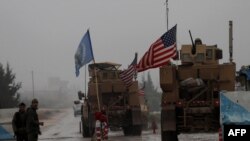U.S. President Donald Trump said on Wednesday the United States would get out of Syria slowly "over a period of time" and would protect the U.S.-backed Kurdish fighters in the country as Washington draws down troops.
Trump did not provide a timetable for the planned military exit from Syria, which he announced last month against the advice of top national security aides and without consulting lawmakers or U.S. allies participating in anti-Islamic State operations.
The decision prompted Defense Secretary Jim Mattis to resign. Trump said on Wednesday he had essentially fired Mattis, whose letter of resignation was seen as a sharp rebuke to the Republican president.
During a Cabinet meeting at the White House in front of reporters, Trump said he had never set a reported four-month timetable for the withdrawal of 2,000 American troops stationed in Syria amid a battle against Islamic State militants.
"We're getting out and we're getting out smart," Trump said.
"I never said I'm getting out tomorrow." He declined to be specific about how long troops would remain in Syria.
In recent days, Trump appeared to back off from any hasty pullout and stressed that the operation would be slow. "We're slowly sending our troops back home to be with their families, while at the same time fighting Isis [Islamic State] remnants," he said on Twitter on Monday.
Republican Senator Lindsey Graham said he came out of a recent lunch with Trump feeling reassured about the Syria policy.
Graham told reporters that Trump was committed to making sure Turkey did not clash with the Kurdish YPG forces once U.S. troops leave Syria, and was assuring the NATO ally that it would have a buffer zone in the region to help protect its own interests.
Turkey views the YPG as a branch of its own Kurdish separatist movement and is threatening to launch an offensive against the group, igniting fears of significant civilian casualties.
U.S. commanders planning the U.S. withdrawal are recommending that YPG fighters battling Islamic State be allowed to keep U.S.-supplied weapons, according to U.S. officials.
That proposal would likely anger Turkey, where Trump's national security adviser, John Bolton, is expected to hold talks in the coming days.
Trump said he was not happy that the Kurds were selling oil to Iran, but that he wanted to protect them either way.
"I didn't like the fact that they're selling the small (amount of) oil that they have to Iran, and we asked them not to sell it to Iran... We're not thrilled about that. OK? I'm not happy about it at all," he said.
"We want to protect the Kurds, nevertheless. We want to protect the Kurds, but I don't want to be in Syria forever. It's sand. And it's death."
Trump has been critical of previous administrations for sending and keeping U.S. troops abroad, and has made bringing troops home part of his signature "America First" policy as he eyes a re-election bid in 2020.





